Isn't Ukraine just a separatist Russian province? Many foreigners ask themselves this question. The same way many Eastern Slavs think that all British Isles are just England. And yet, dynamics of Russian-Ukrainian relations are different from the dynamics of Anglo-Celtic ones🧵 
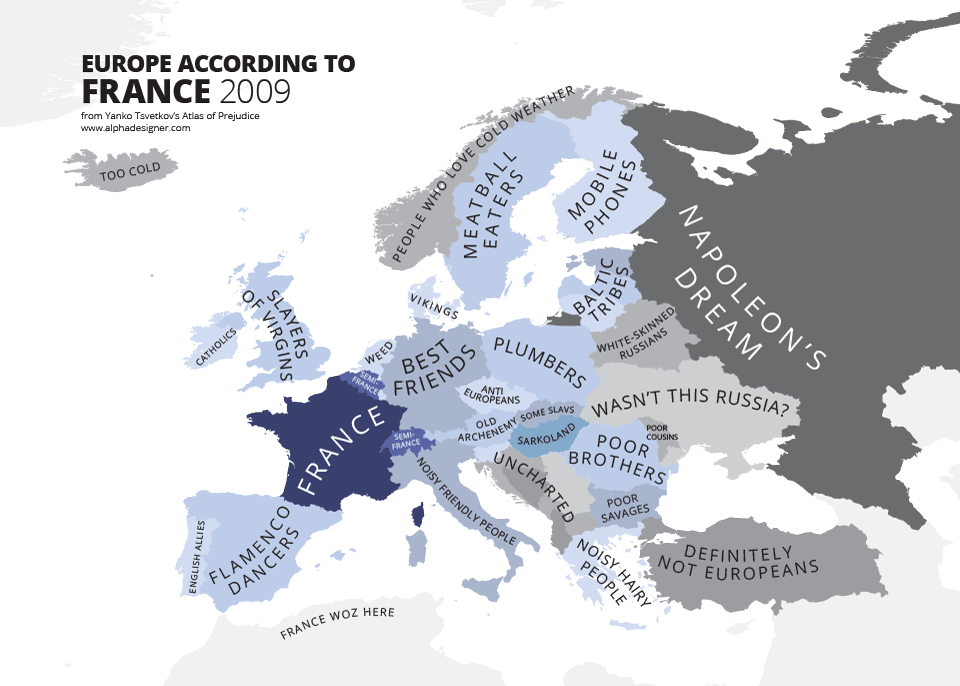
To start with, both Russia and Ukraine were initially shaped by the Slavic Expansion. That's one possible theory of how it went, there are many. And yet, it's highly likely that the colonisation of what is now Russia initially went largely from what is now Ukraine 

You see the direction of Slavic expansion on this map of Uralic languages. There's a huge empty space between Baltic Finns in the West and Volga Finns + Siberian Uralics in the East. Finnic people used to live here, but were wiped out or assimilated during the Slavic Expansion 

Central Russia was colonised by Slavs from Ukraine and Belarus, who wiped out Finnic and Baltic natives. The town of Moscow was first mentioned in a chronicle which described the expedition against Baltic golyad tribe in 1147. Now nothing remains from those guys except toponyms 

Another factor which shaped the history of the region was the Viking (Varangian) invasion of the 9-10th centuries. Vikings entered Slavic lands by rivers, sailed upstream and pushed deep inland establishing their rule. Slavs called them 'Rus'. Probably a borrowed Finnic word 
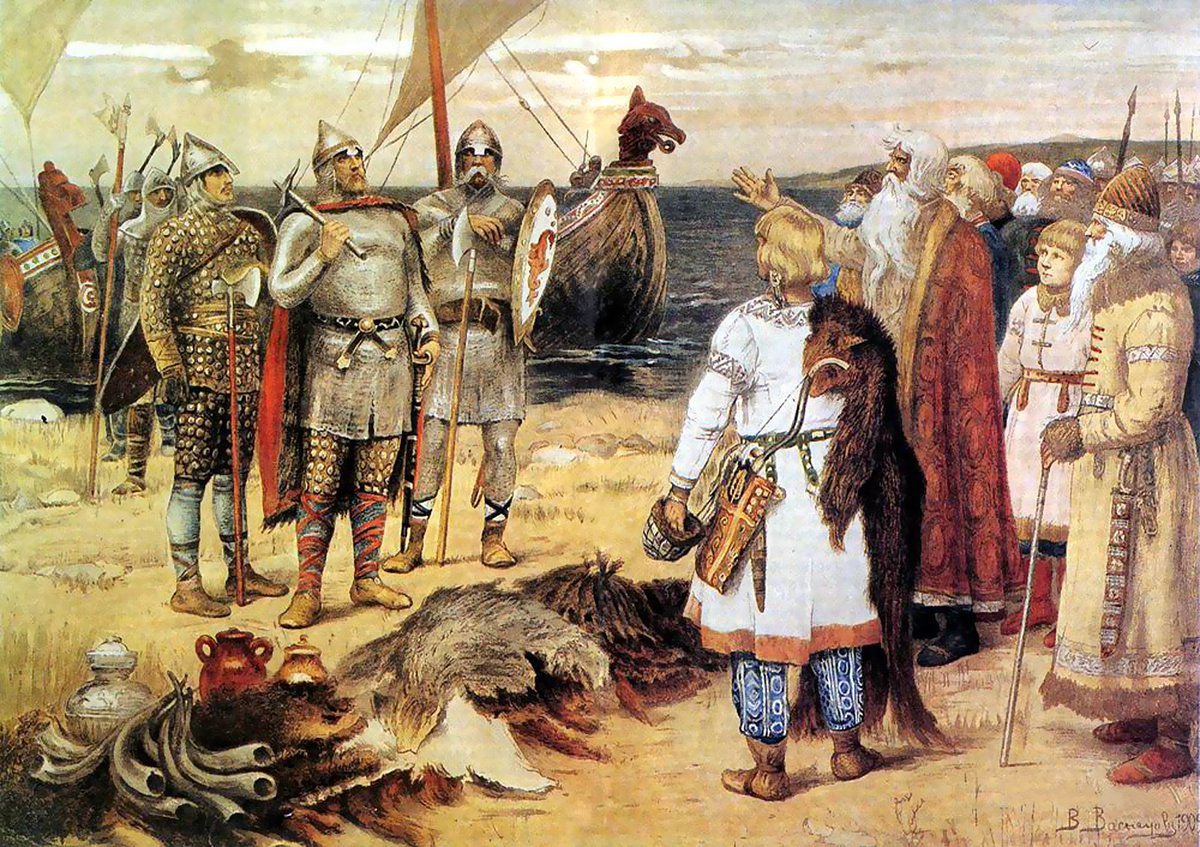
Soon Vikings discovered they can get from the Baltic to the Mediterranean using inland waterways. Enter the mouth of Neva and then through Ladoga, Volkhov, Ilmen and Lovat sail south. Do a portage to the Dnieper and sail downstream all the way to the Black Sea and Constantinople 

This way 'From Varangians to the Greeks' was the major commercial artery. Novgorod, Smolensk, Kyiv etc were major towns on that waterway. Soon ethnonym Rus extended from the Vikings to their Slavic subjects, too. And yet, only the lands around the waterway were considered 'Rus' 

This originally the country of 'Rus' included only this old Viking-dominated country stretching from Novgorod to Kyiv and nothing else. Of course, soon descendants of Vikings established their rule over the northeastern lands, future Muscovy. But it was not considered as 'Rus' 

By 12th c political landscape changed. Earlier princes fought to rule over Kyiv, this ancient seat of power. Andrey Bogolubksy, the prince of Vladimir, was a major innovator. In 1169 he burnt Kyiv down and left home thus shifting the seat of power to the newly colonised northeast 

Interestingly enough, Vladimir, was not considered 'Rus' by anyone, including the locals themselves. When Prince Andrey was killed by his own bojars the chronicler lamented there's no one to succeed him, his brothers being far away - 'in Rus'
The rise of Vladimir was interrupted by the Mongols, who destroyed it just few decades after Andrey destroyed Kyiv. And yet, the legacy of prince Andrey remained. First of all, all the future powers that would contest the rule over the region were coming from the northeast 

Secondly, political culture of Vladimir and its successor states was different. Kyiv and Novgorod were far more republican with citizens' assembly - veche (вече) - playing a huge role in governance. Meanwhile, Vladimir never had veche. It was far more monarchical and autocratic 

Moscow was a successor state of Vladimir and inherited its monarchic tradition. Thus whenever Moscow would annex more republican cities, it would destroy the veche bell that called for veche to assemble. You see as Muscovites take away the Novgorod bell after the city is annexed 
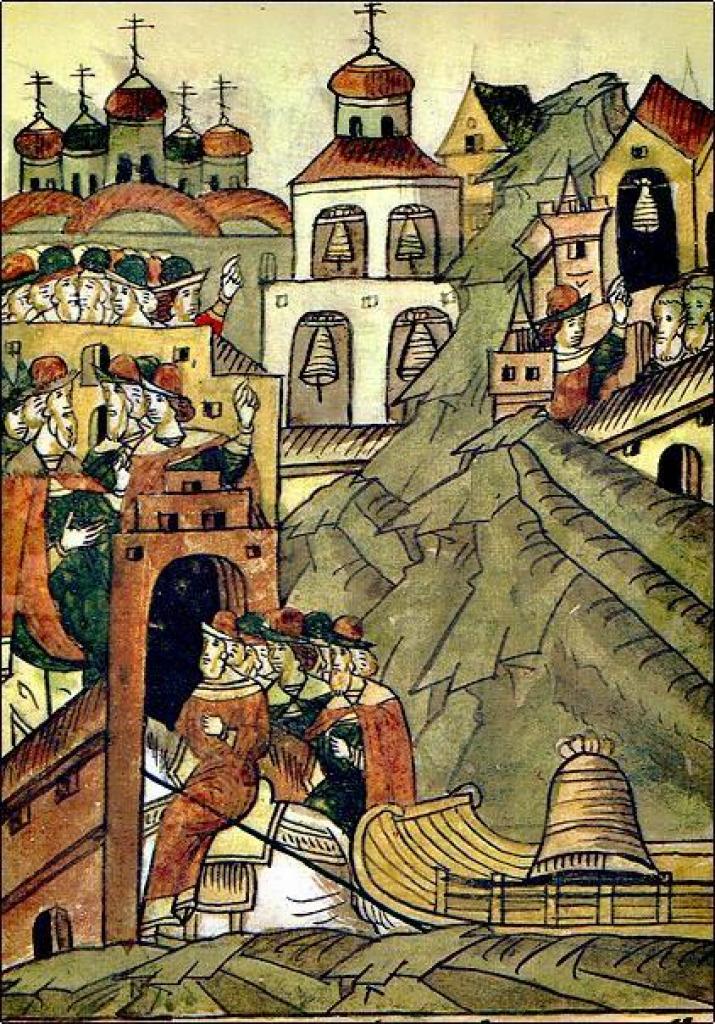
Long after the Mongol conquest, all the other polities lived in the shadow of the Golden Horde/Kipchak Khanate. Some of them would actively collaborate, like Moscow, whose princes were chief tax collectors for the Horde. Others would just hide away in the forests like Lithuanians 

But in 1357 Khan Janibek died and the empire spiralled into chaos. Two years later, his son Berdibek was killed and the legitimate dynasty of Batu-Khan ended. For the next 20 years at least 25 pretenders ruled in the capital, many more in the provinces. The empire ceased to exist
Who benefitted from this chaos? Well, two powers. One of them was Moscow. Another was Lithuania. Lithuania were the last pagan state in Europe. With the Horde in disarray they annexed vast Slavic and Christian Orthodox lands thus becoming the largest empire in the continent 

You see Mozhaisk? That's a town 100 km west from Moscow. It was a Lithuanian border fort. They pushed really deep inland. Slavs who used to rely on protection of a big empire were defenceless against Lithuanian pagans hardened in battles against the genocidal Teutonic Crusaders 
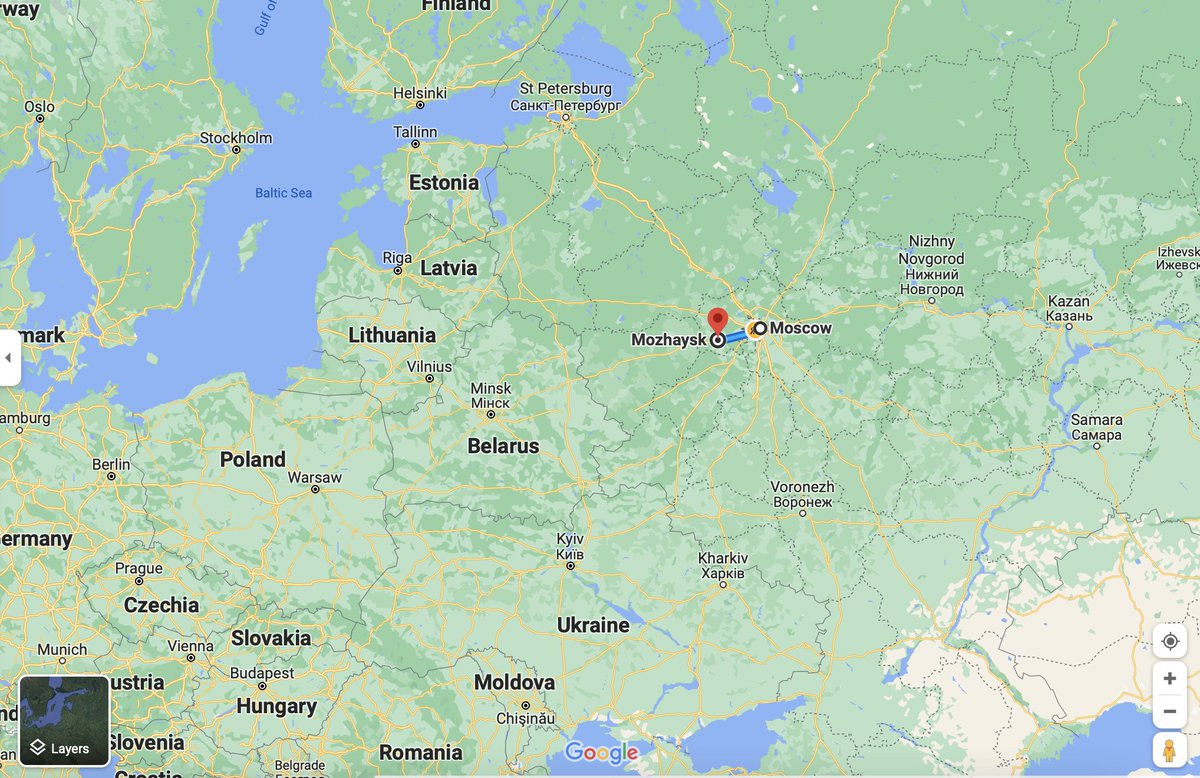
Here you see Eastern Europe by the late XIV c. Lithuania (orange) was huge and contiguous. Muscovy (green) - much smaller and non-contiguous, half of its land being a disconnected northern exclave, like future Prussia-Brandenburg. Why? I'll explain it in my first substack post 
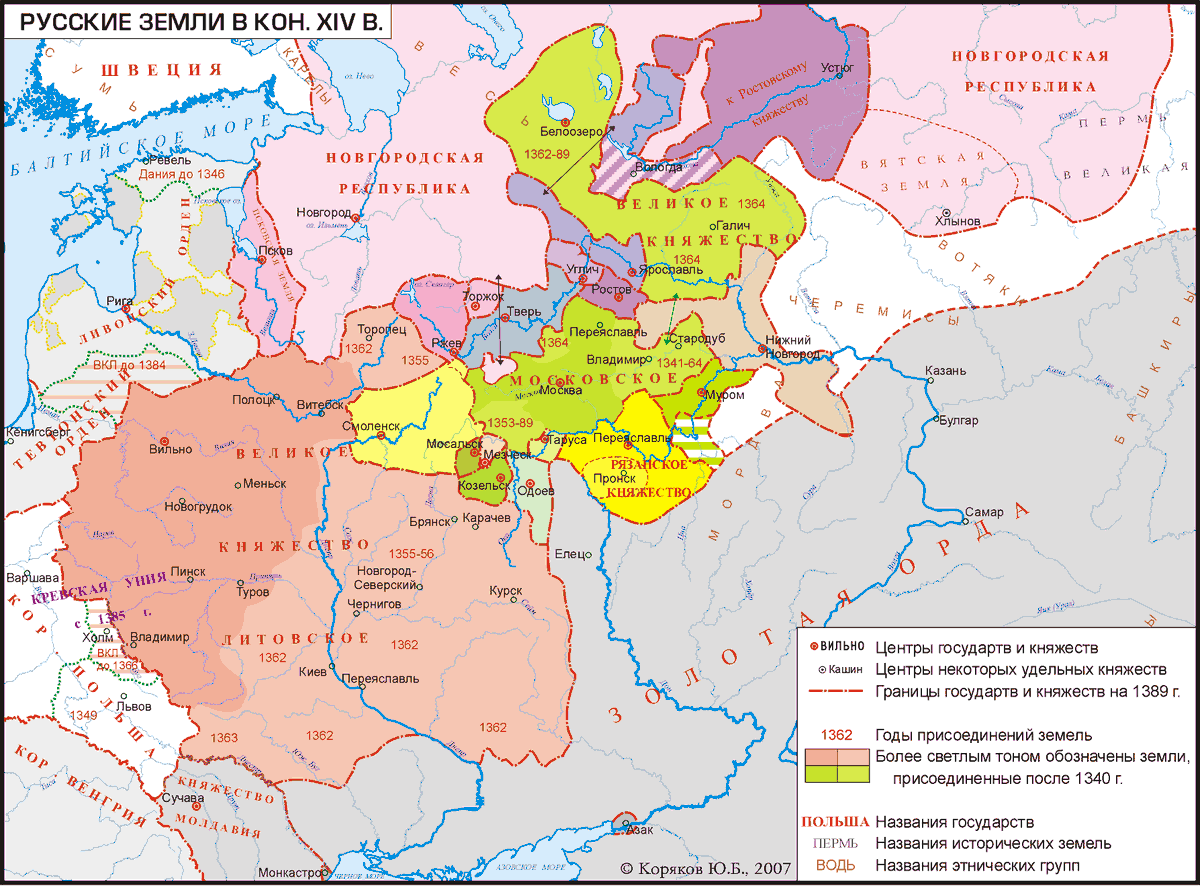
With the Kipchak Khanate collapsing, Moscow and Lithuania became rivals for the power over the Slavic Orthodox lands. How did they view each other? More specifically, how did Moscow view itself and Lithuania in the context of Russian-ness? We have a great source on that
Russian chronicles since late XIV often included 'A list of Russian towns, close ones, and remote ones'. Russian towns were classified into the towns of:
1. Bulgaria
2. Wallachia (=Romania)
3. Podolia
4. Kyiv
5. Volyn
6. Lithuania
7. Smolensk
5. Ryazan
6. Zalesye
7. Tver
1. Bulgaria
2. Wallachia (=Romania)
3. Podolia
4. Kyiv
5. Volyn
6. Lithuania
7. Smolensk
5. Ryazan
6. Zalesye
7. Tver

So, modern Central Russia (including Moscow) was called 'Zalesye' = 'behind the forest'. While Moscow was asserting its position as the capital of the Slavic and Orthodox world, this toponym implied it was a newly colonised land in the boreal forests of the northeast
But let's look deeper. The list includes lands which nobody now considers 'Russian', like Bulgaria or Romania. Probably by the late Middle Ages the meaning of the term 'Rus' changed. Now it meant - people who use Old Church Slavonic as the language of religion. Like Romanians
The term Rus which once referred to the Viking invaders, now appropriated religious and even eschatological connotations. Rus, the land which used the Old Church Slavonic, was ὁ κατέχων, the last bastion of Christianity in the world falling under the power of Antichrist 
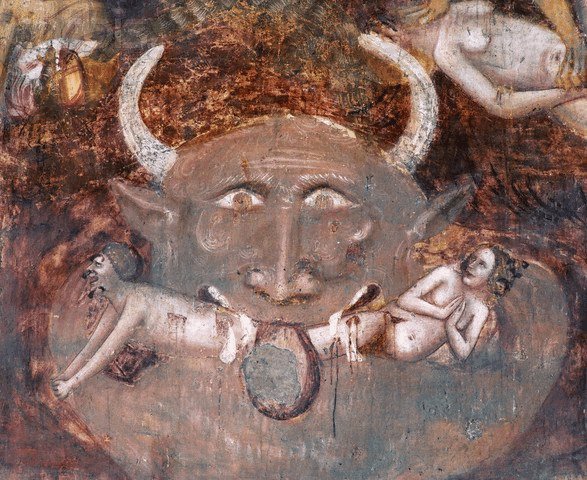
Within the Eastern Slavic discourse it made total sense. Eastern Slavs were christianised by the Greeks. Greek scholars taught Slavs about the dangers of Catholicism and the devilish nature of the Roman Church. Over the centuries Slavs completely interiorised these concepts
In 1439 collapsing Byzantium submitted to the Pope. But Russians wouldn't buy it. When a Greek bishop of Moscow returned from the Florentine Council and preached the union with Rome, he was imprisoned. That was a major turning point: since then only Slavs led the Russian Church
When Constantinople fall to the Turks just 14 years after the church union, Eastern Slavs saw a clear causation. The second Rome stood for a thousand years, until it was corrupted by the Latin heresy and betrayed God. Now it fell, and we are the last Christian power in the world
Muscovite ideology is understandable only within this religious and eschatological context. Rus = the Land of the Old Church Slavonic. And with the Greeks falling to the Latin heresy, it is the last bastion of Christianity in the world, checking the advance of the devilish forces
So the Rus is a religious community spreading across all political lines. And what is the worst danger for this community? Well, that it falls to the satanic Latin heresy the way the Constantinople did. Unfortunately, that was exactly what was happening by the 1400s
In 1385 Jogaila, the last pagan Duke of Lithuania signed the Union of Krewo. As a part of his marriage contract with the Polish heiress Jadwiga, he agreed to convert to Catholicism. After that Jogaila was crowned as the King of Poland, creating a dual Polish-Lithuanian monarchy 

Moscow wouldn'tt buy it. Neither would Lithuanian Slavic Orthodox aristocrats concerned about their status in a now Catholic country. This gave Moscow both a casus belli and a huge fifth column within Lithuania. Rome was Satanic, we remember, and now Lithuania turned to the Satan
The conflict was triggered by the Novgorod question. Kipchak Khanate, weakened it was, was still a formal overlord of Moscow, Tver, Novgorod, etc. Thus Polish-Lithuanian King Kasimir Casimir IV Jagiellon purchased jarlik - a license to rule over Novgorod - from Khan Ahmad 
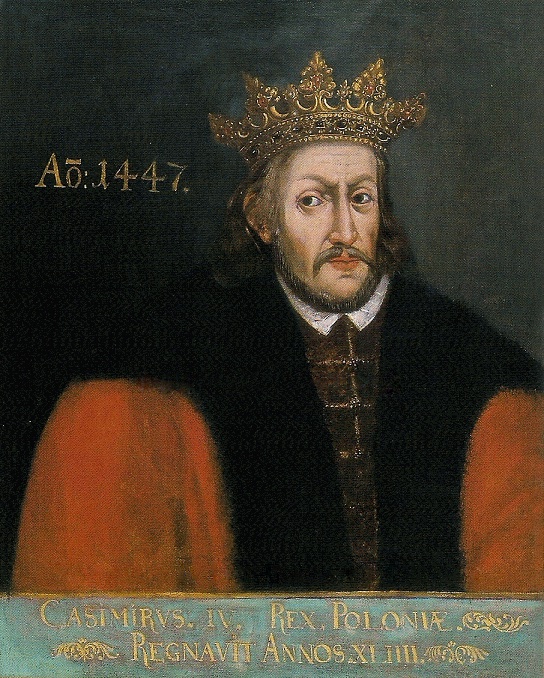
This gave Moscow a casus belli. The war with Novgorod was framed in religious terms. Novgorod betrayed Orthodoxy allying with 'the King, a Latin sovereign', they're infidels now. The Church Council blessed Ivan III on a crusade 'as Samuel blessed David to fight with the Goliath' 

This triggered a chain of very important events. First of all, neither Khan Almad who sold the license to Casimir IV, nor Casimir were happy with the destruction of Novgorod Republic. They allied to punish Moscow. Meanwhile, Moscow allied with the Crimean Khanate to prevent it
This was a war of two alliances: The Horde and Poland-Lithuania (blue) vs Moscow and Crimean Khanate (red). The Horde and Poland-Lithuania agreed to unite their troops to attack Muscovy. But Crimean Khan, an ally of Moscow, attacked Poland-Lithuania, keeping their hands tied 

Thus Ahmad had to face his disobedient vassal alone. Armies of Moscow and the Horde met on the banks of Ugra river in October 1480. They stood there for almost a month. With the river turning to ice, Ivan retreated. Ahmad wouldn't pursue him and returned to his capital Sarai 

This event is known as the end of Tatar rule over Russia. That's not wrong. And yet, modern writers over-dramatise implying that Moscow never paid tribute to the Horde again. It did. Moscow continued to pay, but after the Ugra the amount of tribute was reduced by seven times
Why? We now retrospectively know that the Horde never recovered. But Moscow didn't know that. So it didn't dramatically cut the ties, it rather pushed the boundary to check - how much can we decrease our payments to the Horde without being punished?
Technically tribute to the Horde was never formally abolished. Payments continued for around twenty more years constantly decreasing. By 1500, whatever remained of the Horde was routed by the Crimean forces, former imperial capital abandoned and there was no one to pay anymore 

Now it was time for the war with Lithuania proper. Here you see territorial expansion of Moscow under Ivan III and Vasily III (1462-1533). Finishing with Novgorod, annexing whatever independent Russian duchies left, Muscovite army pushed west beyond the Lithuanian border (green) 

That was partially a conquest by force and partially a betrayal of local Orthodox aristocrats many of whom switched to Moscow. For example, Ivan the Terrible was a son of Elena Glinskaya, a daughter of a high-profile Lithuanian turncloak
Thus Russia first got a foothold on what is now Ukraine. And yet, it created problems. These lands have never been under the Russian power, they historically evolved differently, had different socio-economic order and different culture. It was difficult to integrate them
In fact, for the first 250 years of its rule of this territory Moscow always made a clear boundary between these Ukrainian (черкасы) lands and Muscovy proper. They were run differently, organised differently, treated differently. But I'll talk about it next time. End of 🧵
• • •
Missing some Tweet in this thread? You can try to
force a refresh





